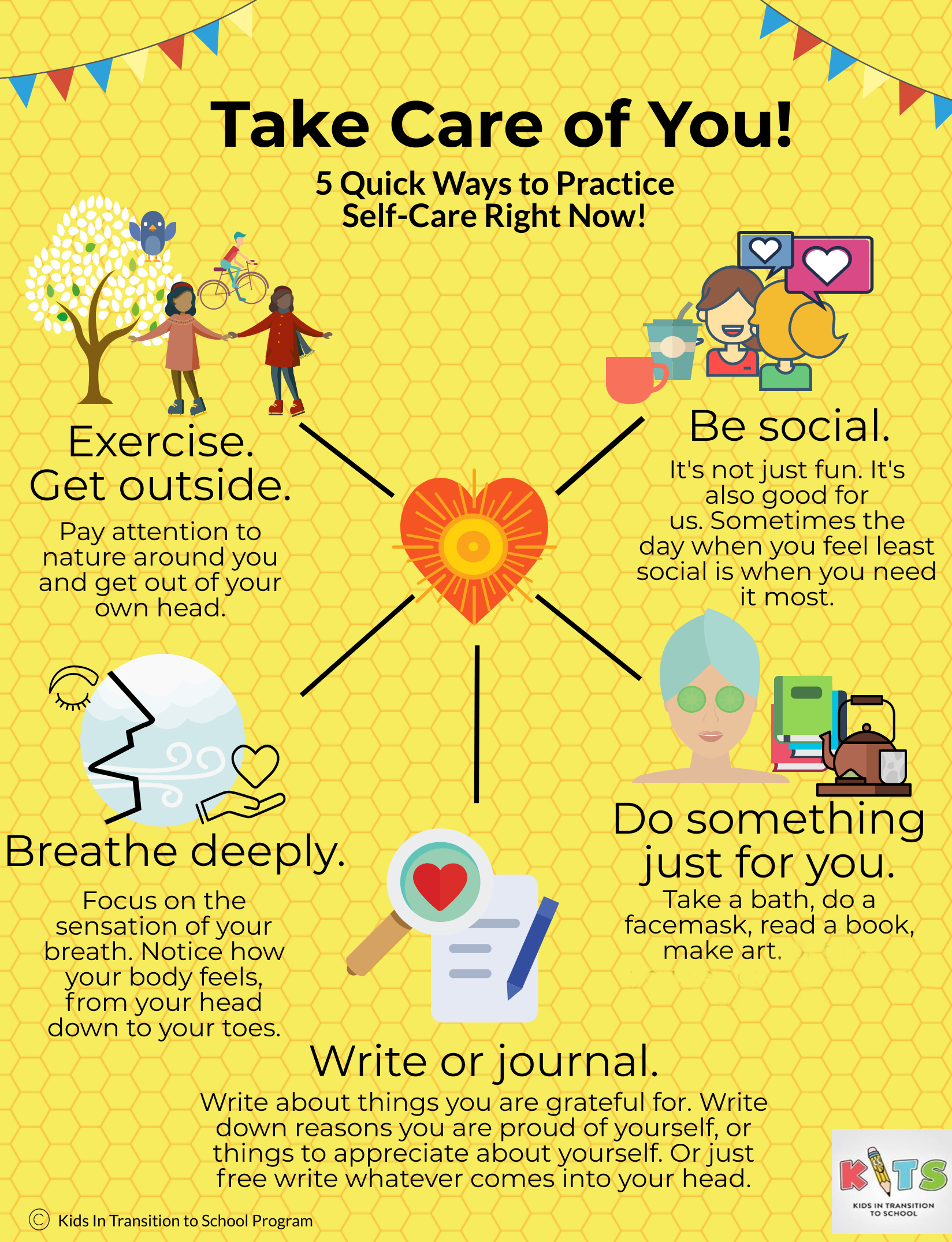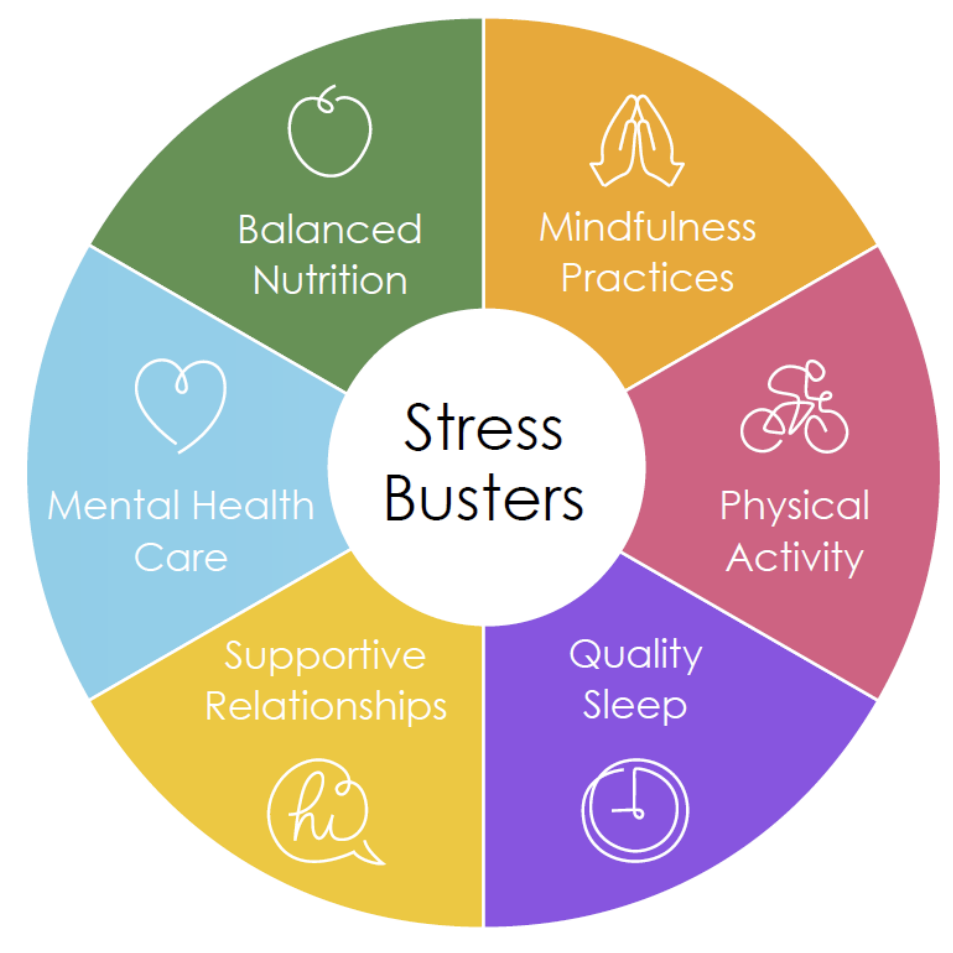What does Mental Wellness mean to You?
Stress is a normal part of our lives; we each need tools to navigate those stressors and the harmful effects it can otherwise have.
-
Turn on your Spidey-Senses

- What do you see?
- What do you hear?
- What do you smell?
- What do you feel?
Mindfulness: the quality or state of being aware of something:
- Aware of your surroundings.
- Aware of your inner self.
- Aware of your body.
Rules for in the classroom and life to lower stress:
-
- Cannot cause mental or physical harm to self
- Cannot cause mental or physical harm to others
- Cannot damage property or belongings
What ways do you use?
- Exercising an hour of physical activity, breathing deeply and slowly, sleeping a recommended 8-10 hours, making the best diet choices, and socializing all serve as healthy and appropriate ways to manage stress.
Do you recognize when others are stressed?
- Use the check-in scale. How are you doing today on a scale of 1-10?
- Check on your friends and loved ones regularly to make sure they are okay too
Resources for when stress feels unmanageable, or you just need some extra info or help.
- Communicate with a trusted family member or faculty member at school
- CA Youth Crisis Hotline 1- 800-843-5200
- Text Crisis Hotline: Text HOME (741741)
- Trevor Project LGBQT Hotline 1-866-488-7386
Maintain your supportive relationships virtually or with those you are at home with. Turn off media and devices for high-quality time together making art, dancing, cooking or reading with loved ones. Remain in touch with mentors, friends, and family by phone or video chat, including schools and community or faith-based organizations.
Engage in 60 minutes of physical activity every day. It doesn’t have to be all at one time. Have a dance party in your bedroom, do 35 jumping jacks in between activities, engage in a 20-minute hula-hooping contest, film a TikTok and share it, power walk around the block, do bedtime yoga, 10 pushups, or jump rope. The list can go on and on.
Bottom line – get your body moving and your heart rate up to burn off stress. Ask friends what resources they have been using or go online and search for at-home work-out routines and to see what comes up and what works for you.
Get sufficient, high-quality sleep. This may be particularly hard right now, but things that help are going to sleep and waking up at the same time each day. Turn off electronics at least a half hour before bed. Drink some warm water or hot tea and read a book after you climb into bed. Avoid caffeine in the afternoon and evening. Ensure your place of sleep is cool, quiet and free of distractions and devices.
This is not about losing weight. This is about ensuring you are getting proper nutrition to help combat stress. Keep regular mealtimes, so you aren’t just snacking all day. Minimize refined carbohydrates, high fat, and high sugar foods.
A general rule of thumb includes 5-9 servings of fruits and vegetables per day and foods rich in omega-3-fatty acids, including fish, nuts and fiber.
If something is troubling you, or not feeling right, reach out to a trusted adult; like your teacher or grandparent. You are not alone, reach out for support.
Resources for when stress feels unmanageable, or you just need some extra info or help.
- Communicate with a trusted family member or faculty member at school
- CA Youth Crisis Hotline 1- 800-843-5200
- Text Crisis Hotline: Text HOME (741741)
- Trevor Project LGBQT Hotline 1-866-488-7386
Practice mindfulness, such as meditation, yoga, or prayer for 20 minutes, two times a day. Apps like Headspace and Calm are easy, accessible ways to get started. Meditations can be found online, as well.
Mindfulness can help strengthen the brain pathways that actively buffer the stress response, helping you regulate your stress response more easily.
- News – Make sure you give yourself a break from the 24-hour news cycle and news alerts. It really does make a difference for your physical and mental health.
- High-sugar/high-fat foods – An increase in the stress hormone cortisol triggers cravings for high-sugar and high-fat foods. Even if you’ve previously been a pretty healthy eater, you may find yourself reaching for potato chips, chocolate chip cookies, soda and other unhealthy snacks. Not only does stress increase our cravings for these types of foods, but stress hormones can also make our bodies more resistant to the hormone insulin, increasing our risk of type 2 diabetes, so try to keep the indulgence on these foods to a minimum.
Each other – our supportive personal connections are scientifically demonstrated to help buffer the impacts of stress on our brains and bodies. Staying in touch with our loved ones and communities virtually, is truly healing. If you see your neighbors when you’re outside, remember to continue physical distancing, but say hello and ask how they are. When you’re at the grocery store – thank the people working there and engage in conversation. This isn’t just important for morale, but staying emotionally connected to one another is biologically crucial for our health.
Deep breaths – you don’t have to be a yogi to know the power of a nice cleansing deep breath. Take them slowly, take them often. Deep breaths are also a great time to check in on our bodies and see where and how we are feeling.
Stepping outside – while we have to practice physical distancing, being outside and finding green space — even if it’s in your back yard— is incredibly helpful for our well-being. Enjoy feeling the sun on our face, listen to the birds singing and see the flowers blooming.
Hydration – stay hydrated. Drink those 8-10 glasses of water a day.
Play – Finding ways to play and laugh is super important for our mental and physical health. Turn off the news and watch a silly movie, or better yet, get creative and make a silly movie with members of your household. Call a friend and talk about the times you laughed the hardest, figure out what impressions you can do, pretend the floor is hot lava. These are serious times, but you can still be silly.
Asking for help or a moment – open up the communication in your house about times when we need help. Whether you have a special code word or just the reminder to yourself. If you need a moment, communicate it and take the moment. If you are having a really hard time, feeling unsafe at home or thinking of harming yourself or someone else, that’s, unfortunately, increasingly common right now.
Practice Guided Meditation
Get comfortable and play the video below to focus your mind on good, positive thoughts and the beauty of nature.
Take Care of You
Sometimes it can be hard to carve out the time to practice self-care, even when we really need it. Here are 5 quick things you can do to give yourself a break.

Your Feelings
Coping with all kinds of feelings
Do you have some super-strong feelings? Maybe you change from happy and confident one minute to sad and confused the next. You are not alone! If you are a teen (or you're becoming one), you may feel like you're on an emotional roller coaster. That's because so much is changing around you and inside you. Even your brain is changing. But you can learn how to cope with all kinds of feelings.
- Get moving. When you exercise, your body makes chemicals called endorphins that help you feel good. Not sure how to get going? Check out our tips for physical activity.
- Sleep tight. Being tired can wreck your mood. In fact, teens who don't sleep enough could be at risk for depression. Get tips for getting sleep.
- Eat right. If your body isn't getting the fuel it needs, you can feel sluggish or grouchy. Read all about nutrition.
- Build positive relationships. Connecting with people who care about you can really boost your mood. You can read about making friends and creating healthy relationships.
- Help others. Helping other people can give you a sense of purpose and pride. It's great to do good in the world! Find out more about connecting to your community and ways to volunteer.
- Stay true to you. You are someone special! Try ways to keep track of your best traits and to boost your self-esteem. Don't let anyone drag you down. How you feel about yourself affects how you feel about life overall.
- Love music? That's one more great way to pump up your mood. Use this cool tool
 to make your own quick video.
to make your own quick video. - Another way to feel good about yourself is to take on a new activity.
What is self-esteem?
Self-esteem has to do with the value and respect you have for yourself. Simply put, it's your opinion of yourself.
If you have healthy self-esteem, you feel good about yourself and are proud of what you can do. Having healthy self-esteem can help you feel positive overall. And it can make you brave enough to tackle some serious challenges, like trying out for a school play or standing up to a bully.
If you have low self-esteem, you may not think very highly of yourself. Of course, it's normal to feel down about yourself sometimes. But if you feel bad about yourself more often than good, you may have low self-esteem. You can read about rating your self-esteem.
How can low self-esteem hurt? Low self-esteem may stop you from doing things you want to do or from speaking up for yourself. Low self-esteem may even lead you to try to feel better in unhealthy ways, like using drugs or alcohol. Also, some people may start to feel so sad or hopeless about themselves that they develop mental health problems like depression and eating disorders.
A lot of things can affect self-esteem. These include how others treat you, your background and culture, and experiences at school. For example, being put down by your boyfriend, classmates, or family or being bullied can affect how you see yourself. But one of the biggest influences on your self-esteem is … you! Check out our tips for ways to boost your self-esteem.
What is self-confidence?
Self-confidence is a little different from self-esteem. Self-confidence has to do with what you think about your skills and abilities.
Self-confidence often comes from trying new things, like speaking more in class or trying out for an afterschool activity. Does that sound a little stressful? That's normal! As you try new things, you will gain confidence in spite of your fears. In fact, that's what real self-confidence is — your belief that you will be fine even in the face of obstacles.
Best boosters
Check out our top tips for building self-esteem and self-confidence.
Rate your self-esteem and self-confidence
If you have healthy self-esteem and self-confidence, you probably will agree with some or most of the following statements:
- I feel good about who I am.
- I am proud of what I can do, but don't need to show off.
- I know there are some things that I'm good at and some things I need to improve.
- I feel it is okay if I win or if I lose.
- I usually think, "I can do this," before I do something.
- I am eager to learn new things.
- I can handle criticism.
- I like to try to do things without help, but I don't mind asking for help if I need it.
- I like myself.
If some of the items on this checklist are true for you, congrats! You're on the right track. And if your self-esteem ever slips, you can try these steps.
If you have low self-esteem and self-confidence, you probably will agree with some or most of the following statements:
- I can't do anything well.
- I have no friends.
- I do not like to try new things.
- I get really upset about making mistakes.
- I'm not as nice, pretty, or smart as the other girls in my class.
- I don't like it when people say nice things about me.
- I get very upset when people criticize me.
- I feel better if I put other people down.
- I don't know what I'm good at.
- I usually think, "I can't do this," before I do something.
- I don't like myself.
If many of the items on this list apply to you, try some ways to raise your self-esteem. It's no fun to be hard on yourself, and you can work to stop. Remember, everyone brings something unique to the world.
Do you want to feel better about yourself? You can learn how to build self-esteem and raise your self-confidence. Try these tips:
- Check out new activities. You'll feel proud for stretching your wings. Does trying something new on your own seem too scary? Maybe see if a friend will go along.
- Be your own BFF. Make a list of things you love about yourself. Are you friendly, funny, creative, or hard-working, for example?
- Celebrate your successes. Try to really enjoy your achievements. Record them in a journal, tell your friends, or hang up pictures or other reminders.
- Tell your inner critic to be quiet. If you have a mean thought about yourself, see if you can change it to something positive instead. For example, if you think, "I'm dumb," try remembering a time you did something smart.
- Don't compare yourself to others. Someone else may have tons of online friends or a "great" body. But everyone has strengths and weaknesses.
- Practice being assertive. Try to express your thoughts, opinions, and needs. It feels great to know you can speak up for yourself! (Of course, you want to do this without stomping on other people's feelings.)
- Find ways to feel like you're contributing. It feels great to help. You might do chores at home or volunteer in your community.
- Set realistic goals. Aim for a goal that you think you can reach. Then make a plan for how to get there. If you pick something very hard, you may get frustrated and quit.
- Forgive yourself when you fail. Nobody is perfect. The important thing is to learn from your mistakes. And it's good to know you can pick yourself up and keep going!
- Find true friends. Hang out with people who make you feel good about yourself. Real friends like you for you.
- Honor your background. It can be great to feel proud of who you are and where you come from. Read about exploring your culture and what girls have to say about their unique identities.
If you try working on your self-esteem for a while and still don't feel good about yourself, reach out for help. Talk to a parent or guardian, doctor, school counselor, school nurse, teacher, or other trusted adult. An adult may be able to suggest other things you can try, and it may help just to talk about how you're feeling. Also, sometimes low self-esteem can increase your risk for depression and other emotional problems. An adult you trust could help you get treatment if you need it.
Most of us feel sad, lonely, or anxious at times. That's just human. But sometimes people feel so sad, hopeless, worried, or worthless that they don't want to do things like get out of bed or go to school. These feelings can be signs that you need help for a mental health problem. Mental health issues can be treated. If you think you have a problem, talk to an adult you trust.
You are not alone
1/2 of teens have a mental health disorder at some point, according to a national survey. You can feel better! Mental health problems can be treated. Get help if you need it.
Online info
Websites and other online resources sometimes offer great support and tools for mental health. Sometimes, though, they actually promote poor habits. Your best bet is to work with an adult or ask your doctor about any online info.
Talk to your parents or a trusted adult if you:
- Can't eat or sleep
- Can't do regular tasks like going to school
- Don't want to do things you used to enjoy
- Don't want to hang out with your friends or family
- Feel like you can't control your feelings and it's hurting your relationships
- Have low energy or no energy
- Feel hopeless
- Feel numb or like nothing matters
- Can't stop thinking about certain things or memories
- Often feel confused or forgetful
- Feel edgy, angry, upset, worried, or scared a lot
- Want to harm yourself or others
- Can't stop yourself from dieting or exercising a lot
- Have aches and pains that don't have a clear cause
- Hear voices
- Feel very sad for months after a loss or death
- Feel like your mind is being controlled or is out of control
Lots of help is available if you are having mental health problems. You can learn about therapy, and you can find a therapist near you. You can text for help  with problems and contact a hotline
with problems and contact a hotline  if you're thinking about suicide. Your life can get so much better!
if you're thinking about suicide. Your life can get so much better!
Teens who have faced mental health problems are connecting with each other through photos, videos, and more on OK2TALK  . Read about their experiences and their stories of hope, strength, and recovery.
. Read about their experiences and their stories of hope, strength, and recovery.

